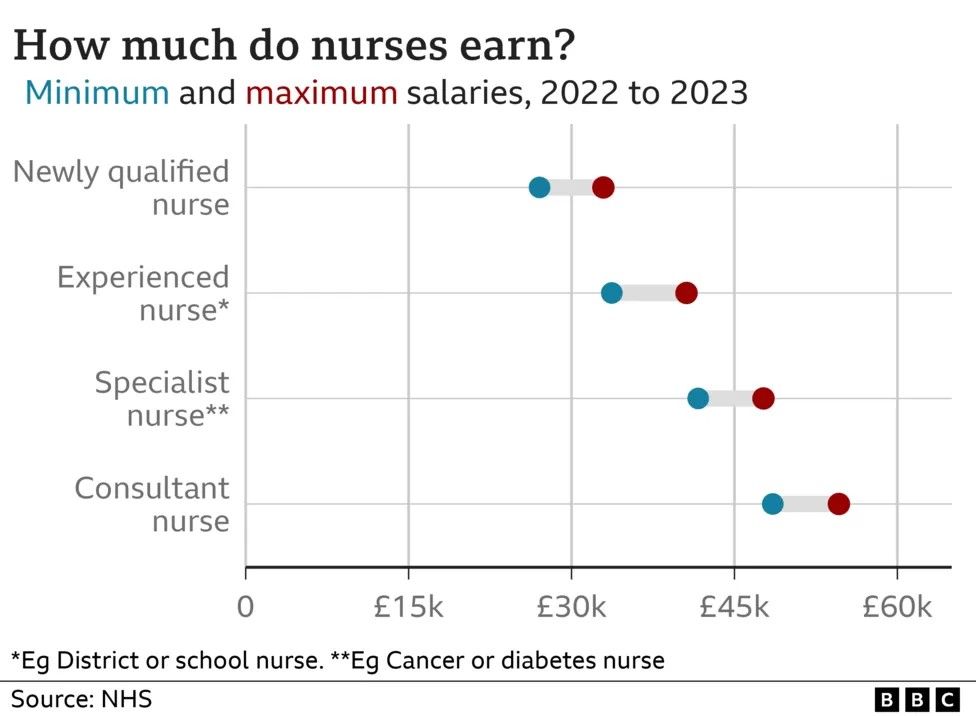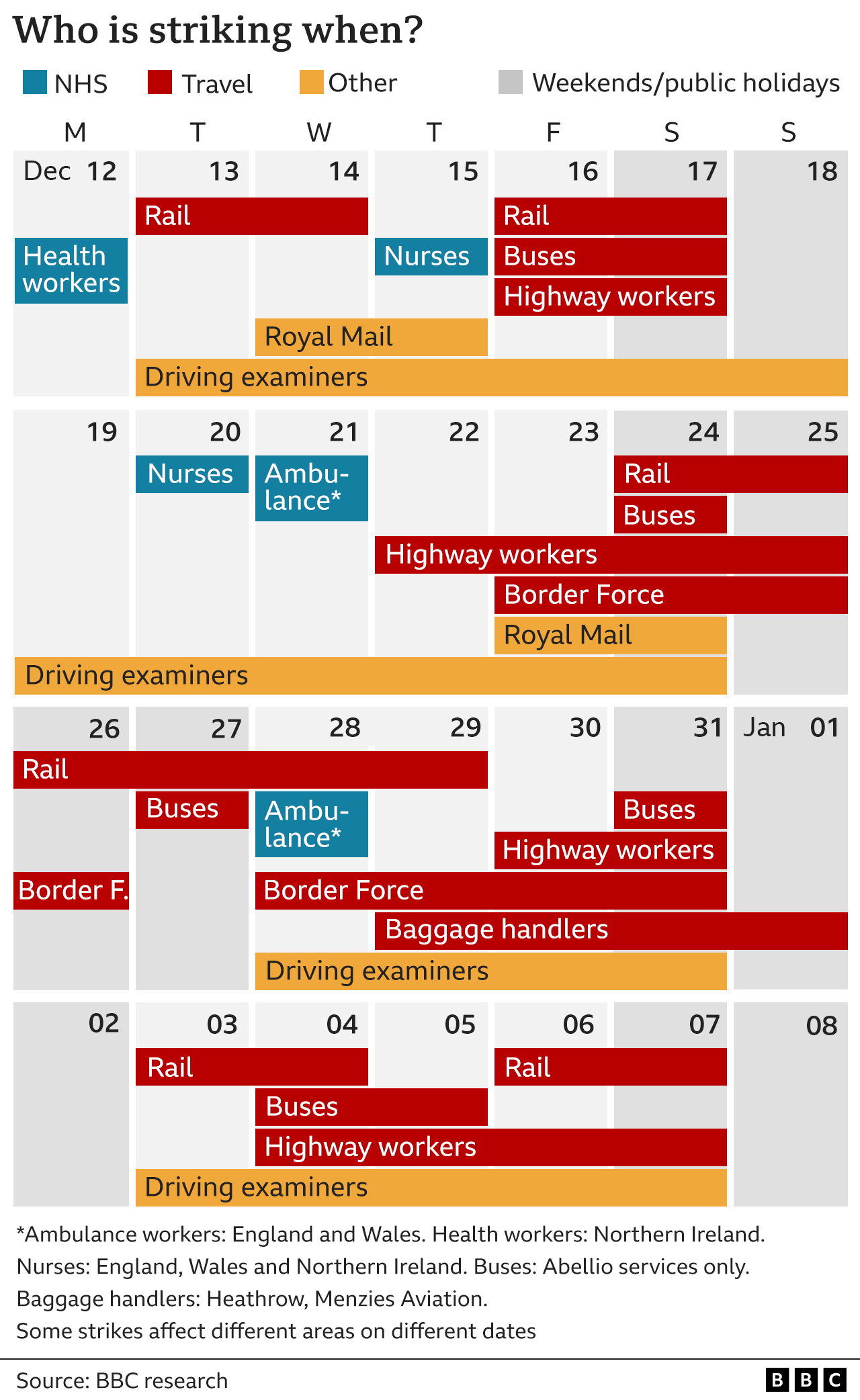Oliver Dowden firm on pay as nurses warn of more strikes
Oliver Dowden #OliverDowden

Media caption,
Oliver Dowden: Unions please call off strikes
By Suzanne Leigh & Paul Seddon
BBC News
The government has reiterated it is “resolute” on pay after nursing unions threatened to escalate strike action if ministers do not engage in talks within 48 hours of Tuesday’s walkout.
Members of the Royal College of Nursing (RCN) are due to stage a second strike on 20 December.
Cabinet minister Oliver Dowden insisted ministers were “reasonable” but had a duty to keep finances under control.
He insisted that nurses’ pay should be decided by the NHS pay review body.
In July, this body recommended a £1,400 rise, with slightly more for experienced nurses – an increase of about 4% on average.
The RCN is calling for a pay rise of 19%, but union leader Pat Cullen said this was a “starting point” and any new offer would be put to members.
Urging the unions to call off the strike, Mr Dowden told the BBC’s Sunday With Laura Kuenssberg: “We will be resolute to this, because it would be irresponsible to allow public sector pay and inflation to get out of control and we owe a wider duty to the public to make sure we keep our public finances under control.”
Challenged about the government’s reluctance to engage on pay, the Cabinet minister in charge of contingency planning for strikes, said the government was “always willing talk”.
“We’re trying to be reasonable, we’re trying to be proportionate and we’re trying to be fair,” he said.
He added that the government was trying to “take the politics out” of the issue of pay by accepting the NHS review body’s recommendations.
But Ms Cullen says ministers are using the recommendations as “cover” and her union was “seriously looking at whether we take part anymore”.
“We have been hoodwinked into lending credence to this process for years and if we aren’t being listened to then it cannot be independent,” she added.
A small number of Conservative MPs have called on the government to revisit its offer to nurses. The latest to do so, former minister Caroline Nokes, called for the government to take “another look at the negotiations”.
Some Tories, including former Cabinet minister Robert Buckland, have also said the pay review body should be asked to make fresh recommendations.
Mr Dowden repeated the government’s claim that inflation-matching pay rises across the public sector would cost a further £28bn – insisting the figure was “robust” despite criticism from the Institute for Fiscal Studies (IFS) think tank who provided a figure of half of this.

The Labour-run Welsh government, which is responsible for the NHS in Wales, has also accepted the pay review’s recommendations, saying it was taking this decision to protect spending.
On Sunday, First Minister Mark Drakeford said the UK government had not given it a big enough budget to pay for a higher increase, and funding a rise from its existing budget would reduce treatment for patients.
The Scottish government has offered NHS workers pay rises averaging 7.5% in a bid to avoid industrial action. It has been accepted by Unite and Unison, two major NHS unions.
However, it has been rejected by another, the GMB, whilst a ballot of RCN members in Scotland closes on Monday. It is not clear when results will be announced.
The RCN’s strike on Thursday was the largest in its history. Across England around 9,999 staff were absent, while nearly 16,000 appointments, procedures and surgeries were rescheduled.
It involved around a quarter of hospitals and community teams in England, all trusts in Northern Ireland and all but one health board in Wales.
Ms Cullen said an escalation would involve a greater number of hospitals and scaling back support for non-emergency services.
During action so far, the RCN has said it will still staff chemotherapy, emergency cancer services, dialysis, critical care units, neonatal and paediatric intensive care.
Some areas of mental health and learning disability and autism services are also exempt.
The action by nurses will be followed on 21 December by a strike by ambulance staff, when Unison, GMB and Unite members take action on 28 December. GMB union members will go on strike again on 28 December.
Around 1,200 members of the military are being drafted in to cover for ambulance workers, as well as striking Border Force staff.
However, health unions warn military staff are not “sufficiently trained”.
Sara Gorton, head of health at Unison, said there was “unfortunately more risk” to patients during a strike, but said: “Every single day patients are being put at risk because of the staffing crisis”.
Industrial action has also been taken by rail workers, Royal Mail staff and other sectors in recent weeks over pay disputes as the cost of living rises.
The government has announced it will publish a new “resilience framework” on Monday, aimed at improving how the UK prepares for and responds to critical issues like strikes.
